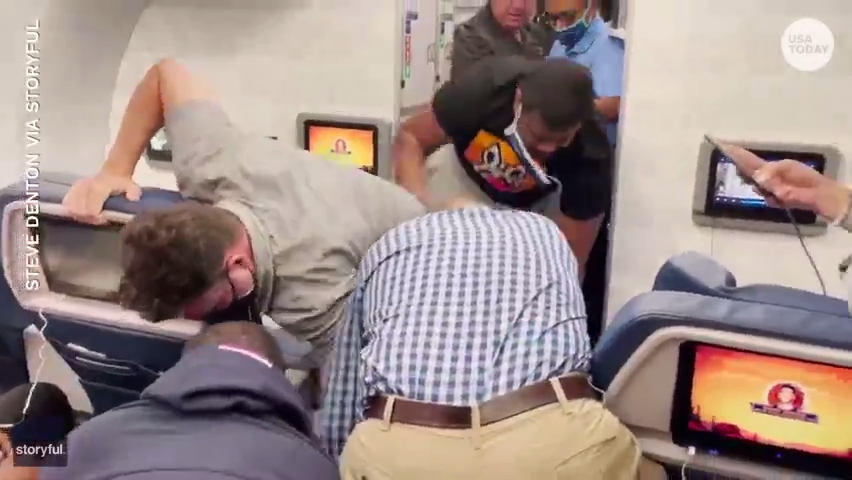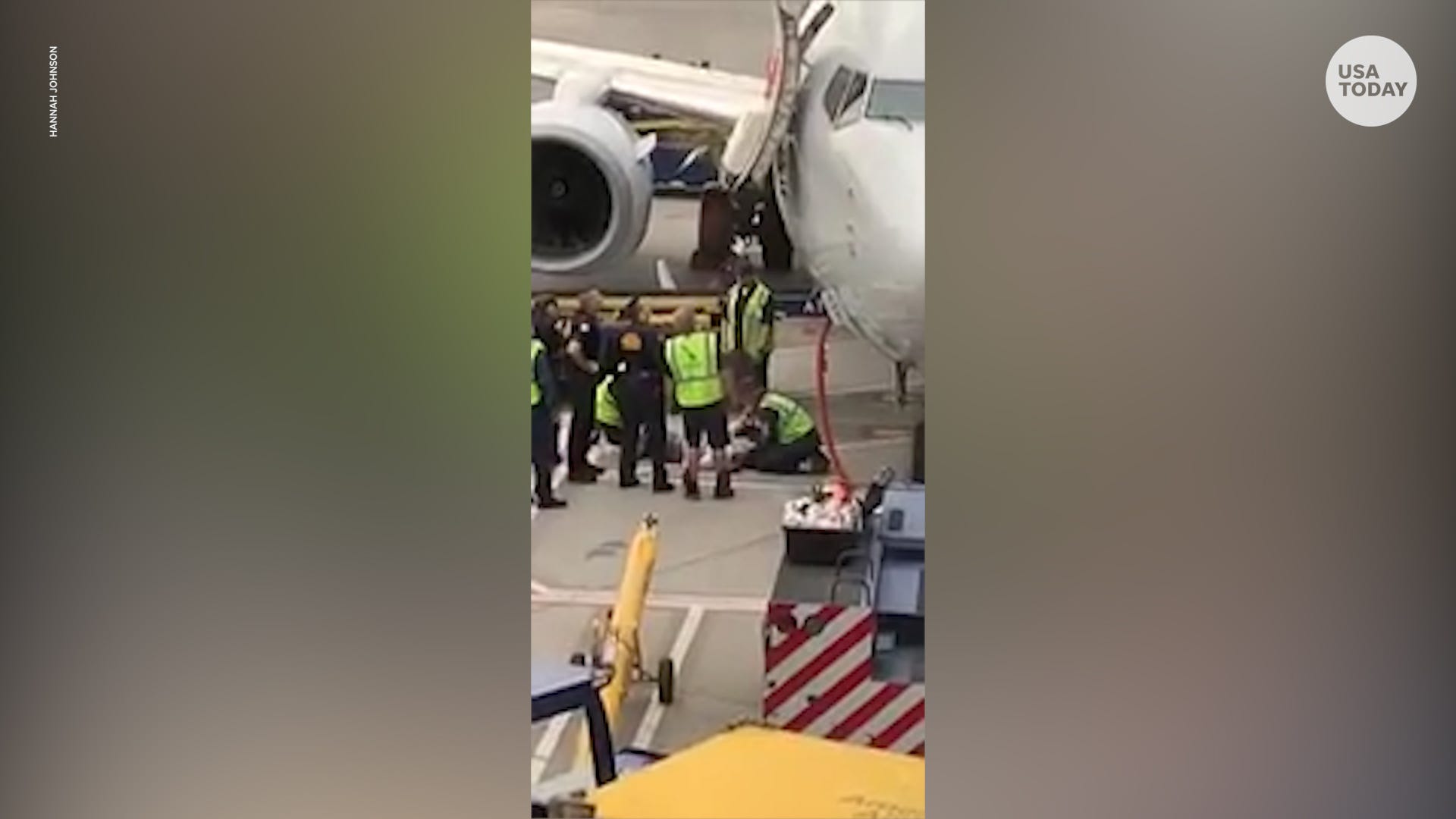'It's not your job to make other people behave better': How to safely handle unruly travelers
Hardly a day goes by when there's not a media snippet about an interaction with an unruly passenger on an airplane – or at a restaurant or at a theme park or in a store.
As travel picks up again this year, you could be faced with the quandary of how to handle an unruly traveler. We asked experts what to do if this happens and for strategies on how to politely try to deescalate a situation, and when you need to raise your concerns to someone with the appropriate authority.
What to do when there's an unruly passenger on a plane
What if: Your seatmate won't comply with mask-wearing mandates.
If you are on a flight, and your seatmate isn't correctly wearing a mask or not wearing one at all, it can be upsetting. Before the situation gets testy, consider a gentle approach.
"If it looks like the person next to you forgot to put their mask on after eating or it slipped down past their nose, you might offer a reminder," suggests Amy Morin, psychotherapist and author of "13 Things Mentally Strong People Don't Do."
Morin advises approaching the person in a way that makes it sound as if you're concerned that he might get in trouble for violating the rules: "Saying something like 'Don't forget your mask. They seem strict about that on flights these days' might encourage someone to put it back on without much resistance."
MASK RULE UPDATE: Masks required on planes, trains and buses for at least one more month as TSA extends mask mandate
TSA FINES: Biden directs TSA to double the fines on travelers who refuse to wear a mask while flying
Keep in mind there’s tension in the skies, and Morin says you may want to avoid telling other people to put their masks on.
"Leave that to the flight attendants who can take appropriate action if the person doesn't comply," she says.
Push the service button requesting the flight attendant.
"You can make up an excuse like you want to know what gate you're landing in. When the flight attendant comes over, they'll see the passenger isn't wearing a mask and are likely to request they put it on," she says.
Story continues below.

What if: Someone is in your seat.
You're making your way down the aisle of the plane, and you notice your seat is occupied. You check your boarding pass again, and that person is in your seat.
This scenario isn't something to get upset over because it can be fixed quickly.
"Keep your demeanor neutral and respectful," says Diane Gottsman, etiquette expert with the Protocol School of Texas. "We often don't realize our own behavior like eye-rolling, anxious body language, loud talking, and our attitude can make matters even worse."
'SIT DOWN, KAREN': Woman taken into FBI custody after mask confrontation on Delta flight
U-TURN IN THE AIR: Woman refuses mask on flight to London, so the pilot took her back to Florida
If the person is nasty and won't move, what do you do?
"Always have proof of your seat designation, and ask to help them find theirs, which probably is a seat ahead or behind yours," she says. "The flight attendant can also take care of the seating situation."
To keep tension low, maintain your composure without acting annoyed, Gottsman says.
Mistakes do happen, and it’s up to everyone to keep things in perspective.
What if: There's an issue with a child.
If you are seated near a child who is behaving poorly, kicking your seat, not wearing a mask or being excessively loud, it's acceptable to take action.
"But you should directly address the problem with the parent, as opposed to the child," says Phil Dengler, co-owner of The Vacationer, a travel resource site.
"I recommend taking a delicate but deliberate approach when talking to the parent," he says. "If it does not stop the poor behavior, you should discreetly contact a flight attendant."
Story continues below.

Manage your expectations while flying
Public transportation or any other type of public venue is a mix of all kinds of people.
"Go into the situation knowing that there will be some rude and inconsiderate people on the plane," Morin says. "Expect some people to argue and others to behave badly. Accept that out of 100+ people on a flight, there will be a few who don't want to follow the rules."
"Remind yourself it's not your job to make other people behave better," Morin says.
How to handle other uncomfortable travel situations
What if: You're dealing with bullies.
You witness someone bullying a person who has a disability or some type of cultural difference. You could be in a store, airport, hotel, theme park or even the beach. How do you handle this, especially dealing with an ignorant person?
"If you see someone being bullied, think about physical safety for a minute. If the other person is in danger, call the authorities for help," Morin says.
'I'M OFTEN FORGOTTEN': Imagine being 'forgotten' in an airport basement for hours. This traveler lived it.
THE TRAVELERS YOU WON'T FIND AT AIRPORTS: Omicron impedes travel for people with disabilities
Morin says that if the issue is verbal only and there's no concern about a physical altercation, you might step in.
If you feel comfortable, you can stand up to the person doing the bullying. Morin says you might say something like, "OK, that's enough." Skip the lengthy lecture about why the behavior is bad as it will probably only fuel the bully's fire, Morin says.
What if: There are rude excursion patrons.
If you're on a tour or excursion and fellow attendees are rude, disorderly and distracting, Morin advises staying focused on what you can control.
"You can control your behavior but not someone else's. So if you can move to a different spot or avoid the person, do so," she says.
"But if you want to speak your mind, do it politely. You might decide to gently point out their behavior if the situation looks like it could be remedied. Saying something like, 'It's hard to hear right now,' might discourage someone from talking," Morin says.
If it looks like pointing out the behavior won't be helpful, Morin suggests you let someone in charge of the tour know that it's affecting your experience.
"Let them decide how to proceed," she says. "Ultimately, you might decide to also just ask for your money back if your experience is affected too much."
Story continues below.

What if: Someone cuts in line at theme parks.
Line jumpers are an annoyance, but managing your reactions is important.
"If someone cuts in front of you, you might decide the best option is to just let it happen," Morin says. "Pointing out the fact that they're cutting in line could become a much bigger deal in your life than it needs to."
Morin says a better way to manage your frustration is to realize that the person cutting in line might delay you by a few seconds or a minute. "That's not much of your time," she says. "Arguing for five minutes and then thinking about their rude behavior for the next hour takes a huge chunk of your time."
Should you suspect the person simply wasn't aware of where the line begins, you might point out, "The line ends back there."
The jumper will probably move to the back of the line if it's an honest mistake, she says.
What if: Someone is hogging chairs at the pool.
Most hotels and resorts allow patrons to save chairs with towels, but common sense will play a role. It's not right to save 10 chairs. Morin suggests you might politely ask them to change their behavior.
Saying something like, "We'd love to sit down. Is it OK to take a few of these chairs," might be helpful, she says.
If you feel like excessive chair saving is happening, alert the pool staff or facility manager. They have protocols in place, and they can enforce the rules in a way you can't, Morin says.
Kindness can go a long way
Morin says people are impatient these days.
"One of the best things you can do is treat others with kindness," Morin says. "It's something you can always control, even when you can't control the situation or how other people act."